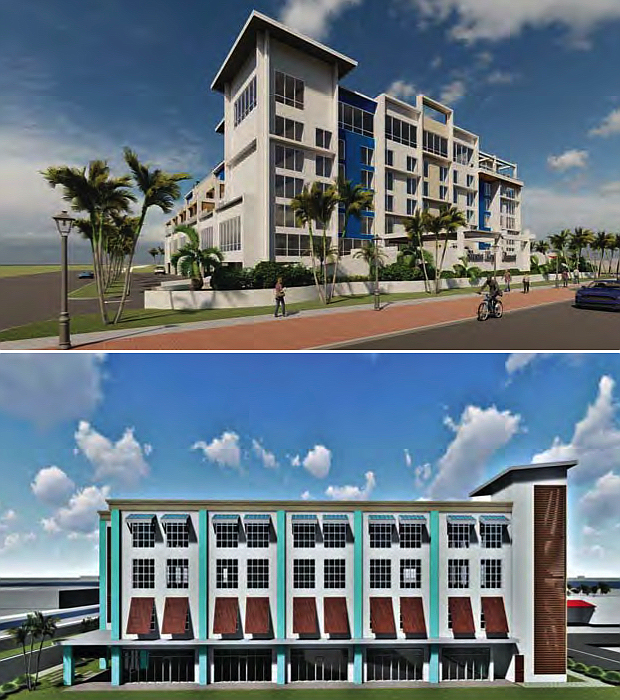- July 13, 2025
-
-
Loading

Loading

Siesta Key resident and former Sarasota County Commission candidate Lourdes Ramirez has scored another key legal victory in her effort to prevent two high-density hotels from being built on the barrier island.
In fall 2021, the Sarasota County Commission approved a new 170-room hotel, the Calle Miramar, in Siesta Key Village on a 0.96-acre beachfront site and a second 120-room hotel on 1.17 acres on the south end of the island at 1260 Old Stickney Point Road.
At the same time, the county changed the definition of hotels from a residential use to a nonresidential use, paving the way for approval. County staff advised the residential density cap of 26 residential units per acre no longer applied.
The proposed density of Calle Miramar is 177 units per acre. The Stickney Point hotel would be 102 units per acre.
On Monday, 12th Judicial Circuit Court Judge Hunter Carroll released his summary judgment, siding with Ramirez in a key ruling that, pending appeal, will prevent the hotels from being developed.

Ramirez’s case was specifically in opposition to the planned Calle Miramar in Siesta Village, but Carroll’s ruling applies to both. He wrote that the density and intensity of the projects violated the Sarasota County’s 1989 Comprehensive Plan, and amendments, definitions and future land use designations applied since are invalid.
First ruling that Ramirez had legal standing to request summary judgment, Carroll wrote, “The Court grants plaintiffs motion for summary judgment with respect to Future Land Use Policy 2.9.1. Plaintiff is entitled to a declaration that the development order is inconsistent with FLU Policy 2.9.1 of the county's Comprehensive Plan. The county and intervenors' summary judgment motions on this basis are denied.”
Subsequent motions for summary judgment by Ramirez were also denied, which include challenges to housing policy compatibility, public expenditures in high hazard areas, evacuation clearance time, protection of coastal resources, and environmental and transportation policies. Carroll ruled they “cannot be resolved on summary judgment due to the existence of disputed issues of fact.”
The county and the intervenors — the hotel developers — have the option of pursuing those matters, but Ramirez said the ruling applicable to the Comprehensive Plan density limits, providing it is upheld if appealed, will prevent the hotels from being built.
“My main focus has been this one policy that said you cannot increase density and intensity out here on the barrier islands, and especially Siesta Key,” Ramirez said. “That one is the grand prize. Everything else would be icing on the cake.”
“In coming to this conclusion, the Court rejects the county's and intervenors' position that the Comprehensive Plan placed no density limits at all for the development of hotels on Siesta Key,” Carroll wrote. “All textual and contextual clues of the applicable ordinances in effect as of March 13, 1989, reject that argument. The development order is inconsistent with FLU Policy 2.9.1 as to both density and intensity.”
Carroll denied Ramirez’s motion that the development violates Coastal Policy 1.2.3 or Future Land Use Policy 1.2.6 because those policies contain permissive terms such as “encourage” and “discourage” rather than mandatory terminology. “The Court cannot address the other challenges due to the existence of disputed questions of fact,” he wrote.

Carroll wrote that the opposing parties must have a dialogue to determine whether they want the court to enter a final judgment invalidating the development order relative to density and intensity, or if they wish to adjudicate Ramirez’s remaining challenges. All parties have 30 days to respond to the court in writing.
Ramirez said she has yet to confer with her attorney on that matter.
“The important thing is to send the message to the county that Siesta Key has the highest residential density in all of Sarasota County, except for downtown Sarasota, and I really want to send a strong message that we don't have the capacity out here,” she said. “We don't have enough infrastructure to handle all these people, and that will hopefully preclude them from constantly going after trying to increase density out here.
“There are a lot of reasons why we shouldn't have mega hotels. We can have hotels out here, but keep it reasonable. That would be the one reason why I would pursue it.”
The county attorney's office declined to comment about the ongoing litigation.
Carroll’s ruling is the second legal victory this year for Ramirez. Administrative Law Judge Suzanne Van Wyck in April ruled that the county’s Comprehensive Plan “specifically discusses the barrier islands as an area of special concern,” acknowledging the “problems associated with development on the barrier islands,” including “the detrimental effect of building along the active beach areas” and ‘“difficulties of evacuating large numbers of people from the keys in time of emergency.”
An administrative hearing is a state-level process whose ruling applies only to the challenge over a violation of a Comprehensive Plan as the state does not intervene on developments, only on zoning ordinances.
That ruling has been appealed separately by the county and the developers. Ramirez has made a request to the appellate court that those appeals be consolidated, but no ruling on that request has been issued.